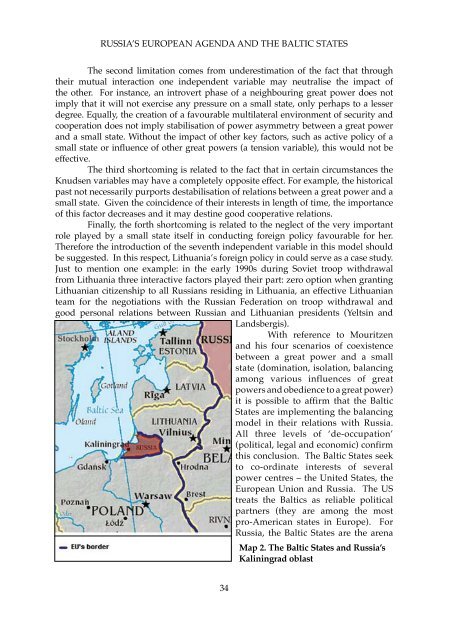Russia's European Agenda and The Baltic States - Defence ...
Russia's European Agenda and The Baltic States - Defence ...
Russia's European Agenda and The Baltic States - Defence ...
Create successful ePaper yourself
Turn your PDF publications into a flip-book with our unique Google optimized e-Paper software.
RUSSIA’S EUROPEAN AGENDA AND THE BALTIC STATES<br />
<strong>The</strong> second limitation comes from underestimation of the fact that through<br />
their mutual interaction one independent variable may neutralise the impact of<br />
the other. For instance, an introvert phase of a neighbouring great power does not<br />
imply that it will not exercise any pressure on a small state, only perhaps to a lesser<br />
degree. Equally, the creation of a favourable multilateral environment of security <strong>and</strong><br />
cooperation does not imply stabilisation of power asymmetry between a great power<br />
<strong>and</strong> a small state. Without the impact of other key factors, such as active policy of a<br />
small state or influence of other great powers (a tension variable), this would not be<br />
effective.<br />
<strong>The</strong> third shortcoming is related to the fact that in certain circumstances the<br />
Knudsen variables may have a completely opposite effect. For example, the historical<br />
past not necessarily purports destabilisation of relations between a great power <strong>and</strong> a<br />
small state. Given the coincidence of their interests in length of time, the importance<br />
of this factor decreases <strong>and</strong> it may destine good cooperative relations.<br />
Finally, the forth shortcoming is related to the neglect of the very important<br />
role played by a small state itself in conducting foreign policy favourable for her.<br />
<strong>The</strong>refore the introduction of the seventh independent variable in this model should<br />
be suggested. In this respect, Lithuania’s foreign policy in could serve as a case study.<br />
Just to mention one example: in the early 1990s during Soviet troop withdrawal<br />
from Lithuania three interactive factors played their part: zero option when granting<br />
Lithuanian citizenship to all Russians residing in Lithuania, an effective Lithuanian<br />
team for the negotiations with the Russian Federation on troop withdrawal <strong>and</strong><br />
good personal relations between Russian <strong>and</strong> Lithuanian presidents (Yeltsin <strong>and</strong><br />
L<strong>and</strong>sbergis).<br />
With reference to Mouritzen<br />
<strong>and</strong> his four scenarios of coexistence<br />
between a great power <strong>and</strong> a small<br />
state (domination, isolation, balancing<br />
among various influences of great<br />
powers <strong>and</strong> obedience to a great power)<br />
it is possible to affirm that the <strong>Baltic</strong><br />
<strong>States</strong> are implementing the balancing<br />
model in their relations with Russia.<br />
All three levels of ‘de-occupation’<br />
(political, legal <strong>and</strong> economic) confirm<br />
this conclusion. <strong>The</strong> <strong>Baltic</strong> <strong>States</strong> seek<br />
to co-ordinate interests of several<br />
power centres – the United <strong>States</strong>, the<br />
<strong>European</strong> Union <strong>and</strong> Russia. <strong>The</strong> US<br />
treats the <strong>Baltic</strong>s as reliable political<br />
partners (they are among the most<br />
pro-American states in Europe). For<br />
Russia, the <strong>Baltic</strong> <strong>States</strong> are the arena<br />
Map 2. <strong>The</strong> <strong>Baltic</strong> <strong>States</strong> <strong>and</strong> Russia’s<br />
Kaliningrad oblast<br />
34

















